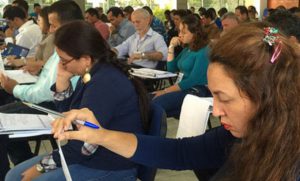FREE FLOW OF INFORMATION
An article from the United Nations News Service
Following a recent agreement to end more than 50 years of conflict between the Government of Colombia and the Revolutionary Armed Forces of Colombia-People’s Army (FARC-EP), a seven-day training session on monitoring and verifying their bilateral ceasefire has begun in the country’s western city of Popayan, with United Nations support. Instructors from the Government, FARC-EP and the UN Mission in Colombia are training 80 men and women who will form part of the tripartite verification and monitoring mechanism at national and regional levels, according to a news release from the UN Mission

-
Members of the FARC-EP take part in the traning with the Government of Colombia and the UN Mission. Photo: UN Mission in Colombia
“This first training session is an important step towards building a stable and lasting peace,” the UN Mission said. “Not only does it mark the beginning of the realization of the agreements reached in Havana but it also marks the full commitment of the parties with a robust and transparent monitoring and verification mechanism to give full guarantees to all Colombians.”
Sessions will cover the verification methodology, logistical aspects, security, gender issues and operational procedures for the transitional local zones and points for normalization, where the separation of forces and the laying down of arms is to take place. The sessions also include theoretical and practical aspects of the Final Agreement, especially related to the bilateral ceasefire and cessation of hostilities, and protocols covering the Monitoring and Verification Mechanism.
In June, UN Secretary-General Ban Ki-moon travelled to Havana, where he witnessed the signing of the agreement on the ceasefire and the laying down of arms. He noted that the “peace process validates the perseverance of all those around the world who work to end violent conflict not through the destruction of the adversary, but through the patient search for compromise.”
The UN Mission in Colombia’s international observers include representatives from eight countries from the Community of Latin American and Caribbean States (CELAC): Argentina, Bolivia, Chile, El Salvador, Guatemala, Mexico, Paraguay and Uruguay.
(Thank you to the Good News Agency for calling this story to our attention)